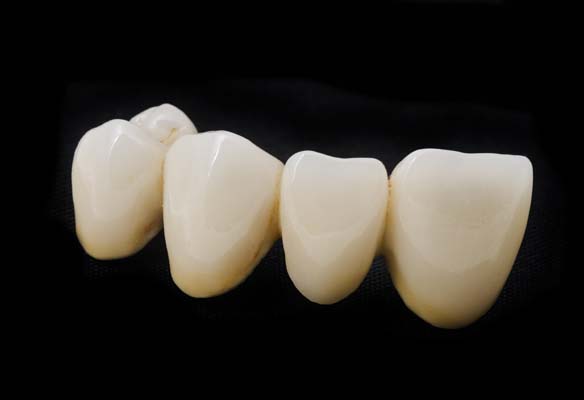4 Types of Dental Bridges

Dental bridges are an excellent way to replace missing teeth and maintain your smile. When you have a dental bridge, you must know the different types of bridges available to make the best decision for your personal needs. This article will cover four types of dental bridges: fixed bridgework, traditional removable dentures, implant-supported dentures, and partial dentures.
Fixed bridgework
Fixed bridgework is a type of dental bridge that is permanently attached to your jaw. The teeth on either side of the gap are prepared, and crowns are placed over them. The space in between allows for the new tooth or teeth. This creates an actual replacement for missing teeth, which means you can't remove them when eating or brushing your teeth like you would traditional dentures.
However, fixed bridges have many benefits as they provide greater stability than removable appliances because they are connected directly into place via natural roots. It also does not require any unique care treatments since there aren't any prosthetics involved; no adjustments are needed. In addition, this appliance will last longer due to its durability and strength, so if taken care of properly, it can last for a long time.
Traditional removable dentures
Traditional Removable Dentures are another dental appliance that is used to replace missing teeth. This dental bridge can be removed when brushing, eating, or cleaning the prosthetic itself – much like traditional removable dentures. However, dental bridges are usually more visible than dental implants, and it tends to shift out of place over time, requiring further adjustments down the line for optimal results.
Traditional bridges are considered "fixed" dental appliances because they attach directly onto adjacent natural roots via dental crowns on either end. This means you cannot remove them when brushing your teeth or eating food, unlike removable appliances such as partial dentures and complete dentures. Fixed Bridges also provide stability in terms of long-term durability since it isn't attached with any adhesive but instead connected by natural methods.
Implant-supported dentures
Implant-supported dentures are dental appliances held in place by implants, a dental procedure where titanium screws are integrated into the jawbone. The artificial teeth for this type of dental appliance can be either full or partial dentures, and they will always need to be removed before brushing your teeth.
Screwing on dental implants may take some time to get used to. Still, it offers many advantages compared with conventional bridges. You won't have issues regarding shifting since these are permanently attached to the natural roots via two dental crowns at each end without any adhesive involved, unlike traditional bridges.
Partial dentures
Partial Dentures are another form of a dental bridge where dental implants are placed in the jawbone through a surgical procedure. The dental crowns used to support these artificial teeth do not require any adhesive, but they will need to be removed before brushing your teeth or eating anything with them. Partial dentures offer some advantages over conventional bridges because there's no shifting involved, unlike traditional dental appliances, and you can also remove them for cleaning purposes when needed.
Request an appointment here: https://www.halhirschdmd.com or call Hal M. Hirsch DMD, FAGD at (856) 270-6447 for an appointment in our Laurel Springs office.
Check out what others are saying about our dental services on Yelp: Dental Bridges in Laurel Springs, NJ.
Related Posts
A broken dental crown is often a sudden issue. Dental crowns are permanent dental restorations. A crown may dislodge because of an injury, an accident, wear, or even old age. The dentist will determine if your crown needs repairs or a replacement. If you want to know what the dentist does to repair or replace…
When getting a dental crown, you might wonder how many visits you need to make before you can get the restoration. Usually, you can expect to have around two office visits to complete the process. There are several steps involved, so you might want to understand each one a bit better. Keep reading to learn…
A dental veneer is a popular cosmetic dentistry solution designed to enhance the appearance of teeth by improving their shape, color, and alignment. Proper care and maintenance are essential to maintain a dental veneer's longevity and aesthetic appeal. Following a few practical steps, patients can ensure their veneers remain durable and beautiful for years.Good oral…
Many people will lose at least one tooth at some point in their lives, which can lead to oral health issues. Fortunately, a restorative dentist can replace missing teeth in several ways. These options can help patients restore the function and appearance of their smiles.Bone tissues need to be regularly stimulated to remain healthy, as…
